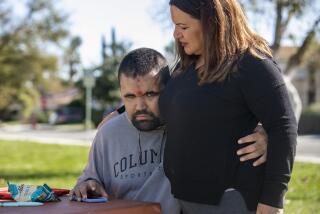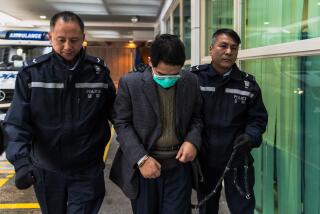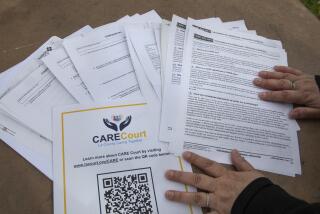Abused Asian Women Assisted in Fresh Starts
Lilyâs marriage began falling apart within days of her arrival from Hong Kong. Her American-born husband would not allow her to drive the car or go outside their Costa Mesa house alone. He forbade her to talk to neighbors or see a doctor when she or her son Kenny (from a previous relationship) were sick.
Then he began hitting and kicking her. He stuffed socks into Kennyâs mouth when the 3-year-old boy cried. On Christmas Day 2000, he beat them so badly that neighbors called police. The countyâs Children and Family Services agency put Kenny in foster care.
In February, Lily was on her own at an emergency shelter in Fullerton where no one spoke Mandarin Chinese. She encountered only frustration with the county system as she sought reunion with Kenny.
Lily was at her witsâ end. (She did not want her last name used out of fear that her husband would track her down.)
Calls to social workers and a legal center finally led to Chun-Yen Chen, executive director of the Asian Pacific Womenâs Center.
âIt was like walking in the desert and finally finding water,â Lily said in Mandarin.
The Los Angeles-based Asian Pacific Womenâs Center aims to help women and their families leave their abusers through a transitional housing program and social services. The center opened after a group of lawyers noticed that many Asian American women returned to their abusers without pressing charges.
Court proceedings were confusing to the women because they did not speak much English and because they did not know how the legal system worked, Chen said. They also feared that speaking up would spur their own deportation.
âIf you are a victim of domestic violence and you are married to an American citizen, you can file for a green card,â Chen said. âThey donât know that.â
Few Asian countries have well-publicized domestic violence laws and few Asian families discuss abuse, Chen said. âThere is a lot of shame involved,â she said.
Bob Payne, a domestic violence investigator with the Los Angeles County Sheriffâs Department, said he and detectives almost always encounter difficulties in trying to persuade an Asian woman to accuse her batterer.
âIn domestic violence situations, most women do not want to cooperate with the police,â he said. âHowever, we do have more cooperation within other communities.... Usually a female Asian victim will be uncooperative or recant from her original statements.â
When they do follow through, they often end up in a bewildering maze of paperwork as they try to file restraining orders, be reunited with their children or simply stay in the country, Chen said. Meanwhile, she added, the 30- or 45-day limit on their stays in emergency shelters ticks away.
The Asian Pacific Womenâs Center was the first in the country, in 1993, to conceive of a transitional housing program for Asian American women. (Two other community groups in Los Angeles, the Center for the Pacific Asian Family and the Little Tokyo Service Center, now also provide transitional housing.)
The centerâs six fully furnished apartments opened three and a half years ago. Families can stay rent-free for as long as two years, while the women sort out immigration status, take care of legal problems, secure housing vouchers, find jobs, get counseling and learn to live without their abusive husbands or boyfriends. After the families leave the apartments, the eight-member staff keeps in touch with the families.
The center, which operates on a $300,000 yearly budget funded mostly through grants, primarily targets the Asian community. But while about 60% of the families are Asian, the center also has helped Latino, African American, African and white families. Half the women are involved with men of their own race; half are involved with men of other races.
While a few women call on their own, most are referred from emergency shelters. Debi Biederman of the Family Violence Project of Jewish Family Services said her group refers a family from its 30-day shelter about once a month.
âThey have a staff thatâs really caring,â Biederman said. âChun-Yen Chen is a huge advocate for women and children affected by domestic violence.
âThey are very culturally appropriate,â she added. âWeâll get someone whoâs monolingual and theyâll work with the client, in terms of getting translation when theyâre going to court or translating case management.â
Since 2000, 21 families have graduated from the Asian Pacific Womenâs Center program. None of the women have returned to their abusers, Chen said.
âThey just need someone to hold their hand a little when they move out,â she said.
Chen is particularly proud of Lily, the first woman Chen helped when she started in her post as executive director.
Lily has not seen her husband since they met in court in 2001 to formalize their divorce. The diminutive 35-year-old now lives in her own apartment in San Gabriel with her 6-year-old son. Last year, she received a driverâs license. In October, she earned her beauty license and she is working at a beauty salon.
âI thought I would die in America and no one would know,â she said softly. âNow, my life is finally put together.â
More to Read
Sign up for Essential California
The most important California stories and recommendations in your inbox every morning.
You may occasionally receive promotional content from the Los Angeles Times.










